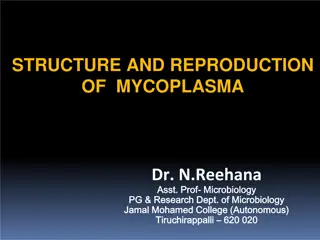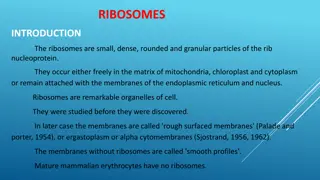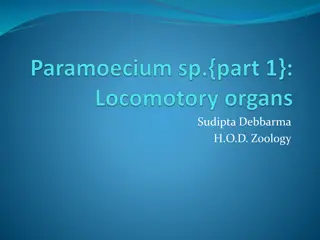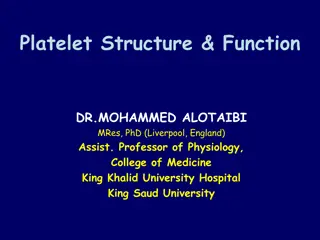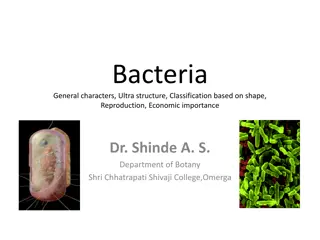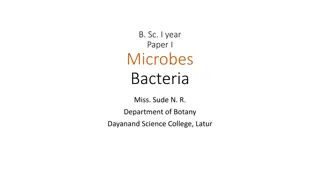Understanding the Ultrastructure of Spermatozoa and Their Components
Explore the intricate details of spermatozoa and their structures, including the head, nucleus, acrosome, and more. Learn about the dimensions of mammalian spermatozoa and the principal parts that make up these essential reproductive cells.
0 views • 23 slides
Mycoplasma: Structure, Reproduction, and Characteristics
Detailed exploration of Mycoplasma covering its structure, reproduction, and general characteristics. Discusses the ultrastructure, species like Mycoplasma pneumonia and Mycoplasma hominis, and their unique traits such as lack of cell wall, pleomorphism, and reproduction methods. The article also to
0 views • 14 slides
Understanding Ribosomes: Structure and Function
Ribosomes, essential organelles in cells, exist in two types - 70s and 80s. They play a crucial role in protein synthesis. Structurally, ribosomes are composed of two subunits held together by Mg++ ions. The ultrastructure of ribosomes, particularly in prokaryotes, is intricate, with RNA and protein
0 views • 18 slides
Understanding Paramoecium Caudatum: A Microscopic Organism with Unique Characteristics
Paramoecium caudatum is a typical ciliate protozoan characterized by the presence of cilia as a locomotor organelle, nuclear dimorphism, and a unique form of sexual reproduction called conjugation. Commonly found in freshwater habitats, this microscopic organism has a distinct structure with a pelli
3 views • 10 slides
Understanding Platelet Structure and Function in Physiology
Platelets play a crucial role in hemostasis and bleeding disorders. This lecture by Dr. Mohammed Alotaibi covers the ultrastructure of platelets, functions of organelles and surface receptors, mechanisms of platelet functions, and the relationship of membrane receptors and granule content in normal
0 views • 47 slides
Understanding Bacteria: General Characteristics and Economic Importance
Bacteria are ubiquitous microorganisms found in various environments, with some living as commensals or symbionts while others causing diseases. They are characterized by their small size, absence of a nucleus, and diverse classifications such as prokaryotes, eukaryotes, cyanobacteria, and archaebac
0 views • 15 slides
Detailed Overview of Bacteria's Structure and Function
Explore the world of bacteria with a focus on their microscopic nature, general characteristics, ultrastructure of bacterial cells, and components like cell envelope, cytoplasm, and nuclear material. Uncover the diverse forms of bacteria, their mode of nutrition, reproduction methods, and unique fea
0 views • 12 slides

